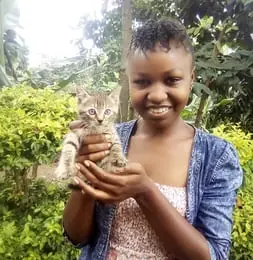
Your cat tries to get your attention by:
- Pawing
- Walking around and between your legs
- Knocking off things
- Loud vocalization
- Jumping up to be at your level
- Sitting on your laptop
Cats seek attention if they lack stimulation, are sick, or have been left alone for a long time. Give your cat treats, play with them, and pet them.
Your cat can try to get your attention in many ways. They may swipe at your feet as you pass, follow you everywhere while meowing, or stare at you.
As a cat owner, you might wonder why your cat does these things, and what you can do about it.
This article will explain why and how your cat seeks your attention, and the best ways to deal with such behaviors.
The cause of attention-seeking behavior can be either physical or emotional, so you first need to know what is normal, and when you should seek professional help.
Fortunately, I have done all the homework for you, so that you know why your cat is seeking attention from you.
A lonely Cat Seeks Attention
Any cat of any age can engage in attention-seeking behavior. According to cat coach, Pam Johnson-Bennet, most cats that have attention-seeking behaviors are the ones who lack enough stimulation, or are left alone for a long time.
Your cat appreciates your presence. They like being petted, stroked, and playing interactive games.
If you leave your cat alone for a long time, they are likely to seek attention from you through meowing, and other behaviors, as we shall soon see.
Common Attention Seeking Behavior and Causes
When your cat wants attention, they will go to great lengths to get what they want. Regardless of your feline’s personality, you probably see them exhibiting some needy behaviors.
These could include lying on their back and showing you their belly, or curling their tail around your feet.
Your feline friend has a lot of tricks to get you distracted, such as:
1. Loud vocalization

The main mode of a cat’s communication is meowing. Funny enough, as cat owners, we have learned to understand the different pitches, and tones of our cat’s meow, and what they mean.
Loud vocalization is a sign that your cat needs attention. They may start with a quiet meow but if you don’t respond, they accelerate the pitch to a loud screech.
If you are busy doing something other than focusing on them, this loud meow will get your attention. You will probably come running to see what is wrong with your feline companion.
Cats enjoy social interactions with their human owners, and some show how they need you by being vocal.
According to ASPCA, these are the main reasons why cats meow:
- To greet
After being away for a whole day, your cat misses you. When coming back, they are happy to see you, and thus meow.
Your cat now wants you to give them full attention, and tell them how your day was.
- To ask for food
Treats and food are almost every cat’s favorite. Some will meow each time you open the fridge or, enter the kitchen.
If your cat is the demanding type, they can meow to beg you to serve them breakfast, or even have a taste of human food.
- To ask to be let in or out
Your cat may meow to let you know that they want to go out. You can see your furry friend crying while standing at the door, and looking at you.
The more you ignore, the louder the meow gets. If you have an outdoor cat, but want to train them to be indoors, you are in for some loud meowing.
The transitioning might be difficult for them to handle, and your cat may cry for a long time before they get used to staying indoors.
2. Sit on your laptop
This is perhaps one of the most effective ways your cat can get your attention. When your furry friend sees you occupied looking at your laptop, they jump right on the keyboard.
Some cat owners assume that their cats like to sit on their laptop because it is warm. While this could be true, the behavior is also your cat’s way of trying to distract you from what you are doing, and get you to pay attention to them.
If your cat is interested in looking at the laptop so much, you can play them a video of squirrels or birds.
3. Waiting for you outside
It is not easy to have some me-time when you have an attention-seeking cat as a pet. Even if you shut your bedroom or home office, your cat camps outside the door waiting for you.
They might paw and scratch at that door attempting to open it. Even if they don’t succeed, your cat will wait for you outside.
And it is not uncommon to see a cat wait for its owner outside the bathroom door.
These are all attention-seeking behaviors from your feline because they want to communicate loneliness.
4. Stare at you
If you have ever engaged in a staring contest with your cat, you know that you are the one to lose.
Cats can be pretty good at staring. All they need is to stare at you with their big eyes to command your attention.
It’s amusing, and you find yourself stopping what you are doing to enjoy the stare from your cat.
5. Knock things off

Surprisingly, your cat rarely knocks things over when you are away. HoweverI in your presence, they deliberately push down items that you view as valuable to get your attention.
They can knock down a flower vase, or push a TV remote off the table.
Depending on how alert you were, the item might crash on the floor, or you might be quick enough to catch it before it falls.
Either way, your feline has won your attention.
6. Bring you gifts
Your cat views you as their parent, and wants to please you by bringing you gifts. These might be in the form of a catnip, toys, or shoes. This is not just a dog thing.
If your cat greets you with a toy when you come from work, they are looking for some playtime.
Some cats bring their owners dead rodents as gifts. As innate hunters, cats like to bring down prey. After a successful hunt, they may eat some of the animals and leave some body parts.
Your cat knows you will find the unpleasant surprise, and watches how you will react. Perhaps you might try to give them a treat to distract them from the dead animal.
However, doing this reinforces your feline’s behavior. They may learn to bring more dead prey to you in exchange for attention, or reward.
7. Snuggle up to you
Snuggling up with your cat is a pleasant experience. Your furry friend knows this, and comes close to you, rubbing against your leg or arm to get your attention.
This attention-seeking behavior always works because, as a cat owner, you are moved to pet your cat, give them some treats, or play.
If Your Cat Is Wanting Excessive Attention
Our cats are social creatures that enjoy our company. They are also very intelligent. If you combine these two facts, you have a cat that is smart enough to make you heed their call.
There’s nothing wrong with responding to your cat’s needs. However, if your feline is the type that seeks attention when you are doing something important, like making a call or sleeping, you need to know how to deal with this behavior.
The level of attention your cat seeks depends on its breed. Some breeds are friendlier than others, and may want to hang around you every time.
You also need to remember that attention is not the only thing your cat wants. Sometimes your cat wants you to notice, and fulfill a need they have.
1. Ignore your cat
The best thing you can do to your cat when they demand attention is to ignore them. Granted, it is not easy to ignore your cat when they are standing on your head as you watch TV.
But ignoring your feline friend helps them learn that their behavior does not get your attention, and they will not repeat doing it.
2. Find out if your cat is sick
If your cat has become more vocal lately, check if something is wrong with them. Numerous diseases such as kidney diseases or overactive thyroid can make a cat feel thirsty or pain, and meow excessively.
Aging cats can also become more vocal because they are disoriented, and cry for no apparent reason.
3. Stimulate your cat
Cats thrive on physical stimulation. Your cat enjoys chasing objects, or finding the hidden treat on food puzzles.
That’s why sometimes it grabs your feet as you pass by. Therefore, it’s important to provide other outlets for your cat’s energy, and attention.
By stimulating your cat, you provide it with adequate environmental enrichment to prevent boredom.
Here are ways to provide such an environment:
- Puzzle feeders
- Scratching posts located at various points
- Elevated areas for rest and play
- A cat tree for watching the birds
Remember that your cat is instinctively a hunter with incredible senses. You need to provide appropriate energy outlets for them to practice their predatory behavior.
4. Be consistent with the schedule
Our feline friends love routines, and they rely on consistency in their daily lives. Whether it’s feeding, playing or grooming sessions, stick to a schedule.
If you aren’t consistent with your cat’s feeding time, litterbox cleaning, or playing, they may engage in attention-seeking behavior to remind you to take care of their needs.
Schedule a time when you play with your cat, exchange physical interaction, and show them affection.
You will then have a happy cat that will no longer need to knock things off the table to get your attention.
5. Try brushing or petting
You can use a soft brush or your hands to brush your cat. Some cats find this to be soothing. If they don’t like to be brushed, you can just scratch it behind its ears.
